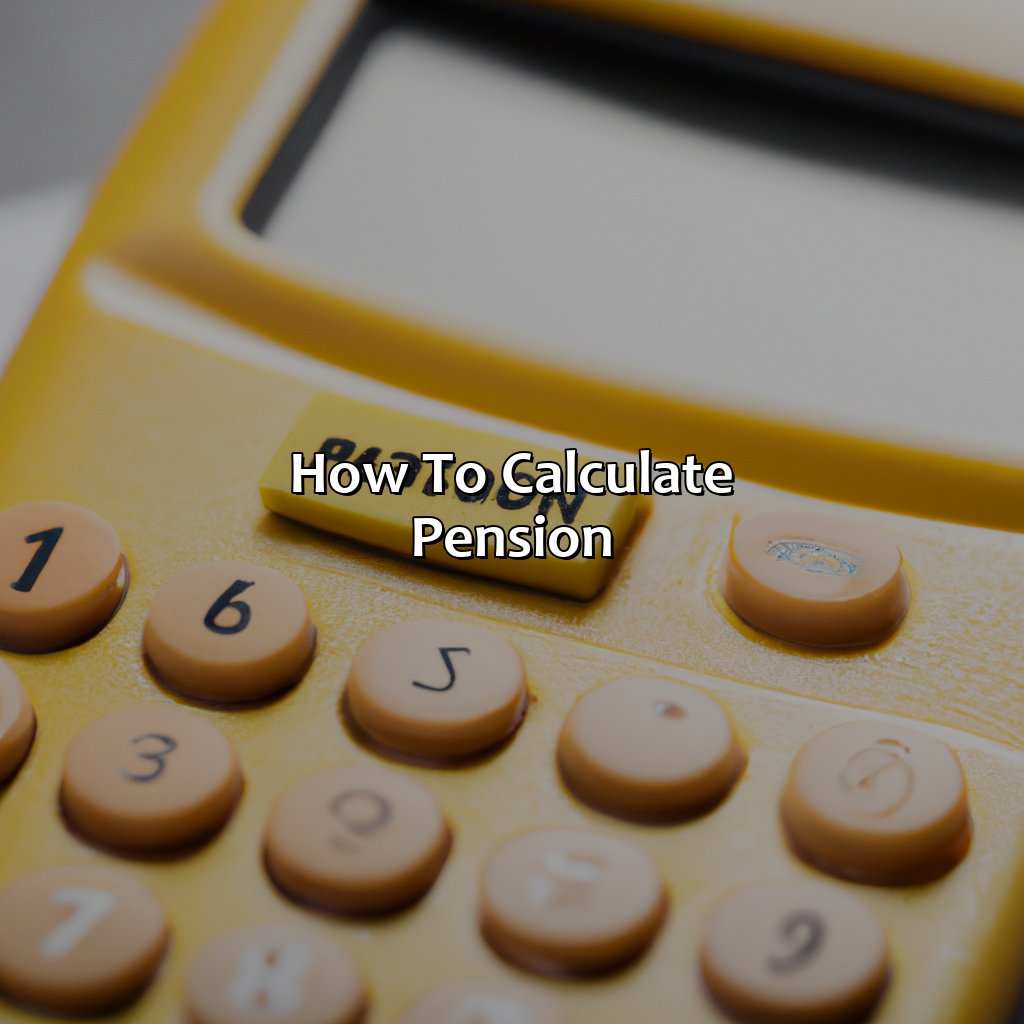How To Calculate Pension?
Key Takeaway:
- Understanding pension calculation is crucial for retirement planning: It is important to understand the different factors that affect pension calculation, such as age, retirement plan type, salary, and service years. These factors can impact the amount of retirement income you receive.
- Calculating your pension requires a few steps: To calculate your pension, you need to determine your average final salary, service credit, and multiplier. Once you have this information, you can estimate your pension amount. Accurately calculating your pension can help you plan for retirement and make informed financial decisions.
- Resources are available to assist with pension calculation: There are resources available, such as retirement calculators and pension counselors, that can help you accurately calculate your pension. It is important to use reliable resources and seek professional assistance when necessary to ensure your retirement planning is on track.
Do you want to ensure a comfortable retirement? Calculating your pension is a must to plan for a secure financial future. Knowing how to calculate pension will take away the guesswork and give you clarity on your retirement goals. Let us help you understand the process and manage your pension more effectively.
Understanding Pension Calculation
Understanding How to Calculate Your Pension
Calculating your pension can be a complicated process that requires careful consideration of various factors. One essential component is determining your pensionable service period and pensionable earnings. These factors contribute to the calculation of your pension amount. If you are divorced, you may also have to consider how much of your pension your ex-spouse can claim. Calculating this amount can also be a complex process that requires legal and financial expertise.
When calculating your pension, it is essential to consider the different types of pensions available, such as defined benefit or contribution plans. Additionally, factors such as age, years of service, and average salary are essential for calculating how long a pension lasts.
Importantly, the type of pension formula used can vary between employers and different pension plans. Therefore, it is essential to review your plan’s details carefully to ensure accurate pension calculation.
Pro Tip: It is always wise to seek advice from a pension advisor or a financial planner to ensure that your pension calculations are accurate and financially beneficial.
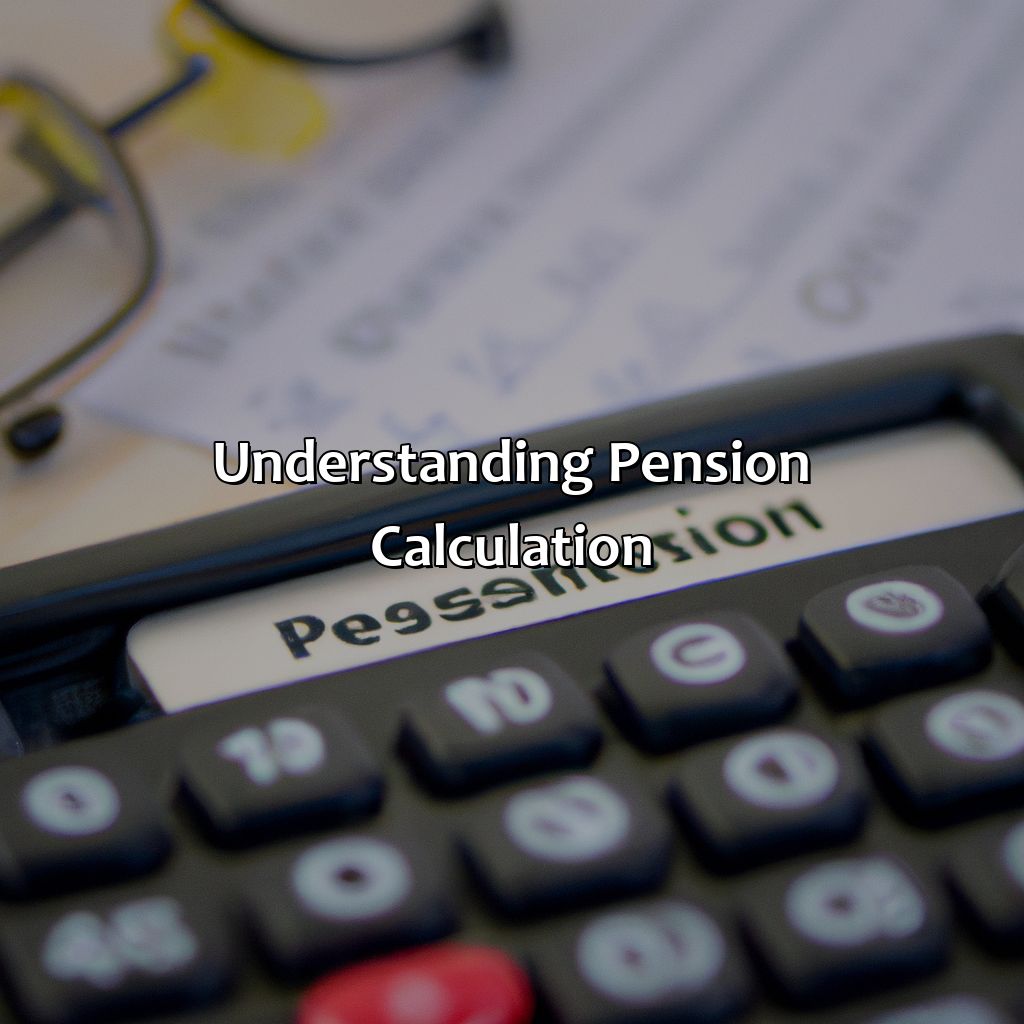
Image credits: retiregenz.com by David Washington
Factors Affecting Pension Calculation
Calculate your pension smartly. Think about age, retirement plan type, salary and service years. Read the article “How to Calculate Pension?“. It has two sections: “Age and Retirement Plan Type” and “Salary and Service Years“. These provide solutions to know how much money you’ll receive during retirement.
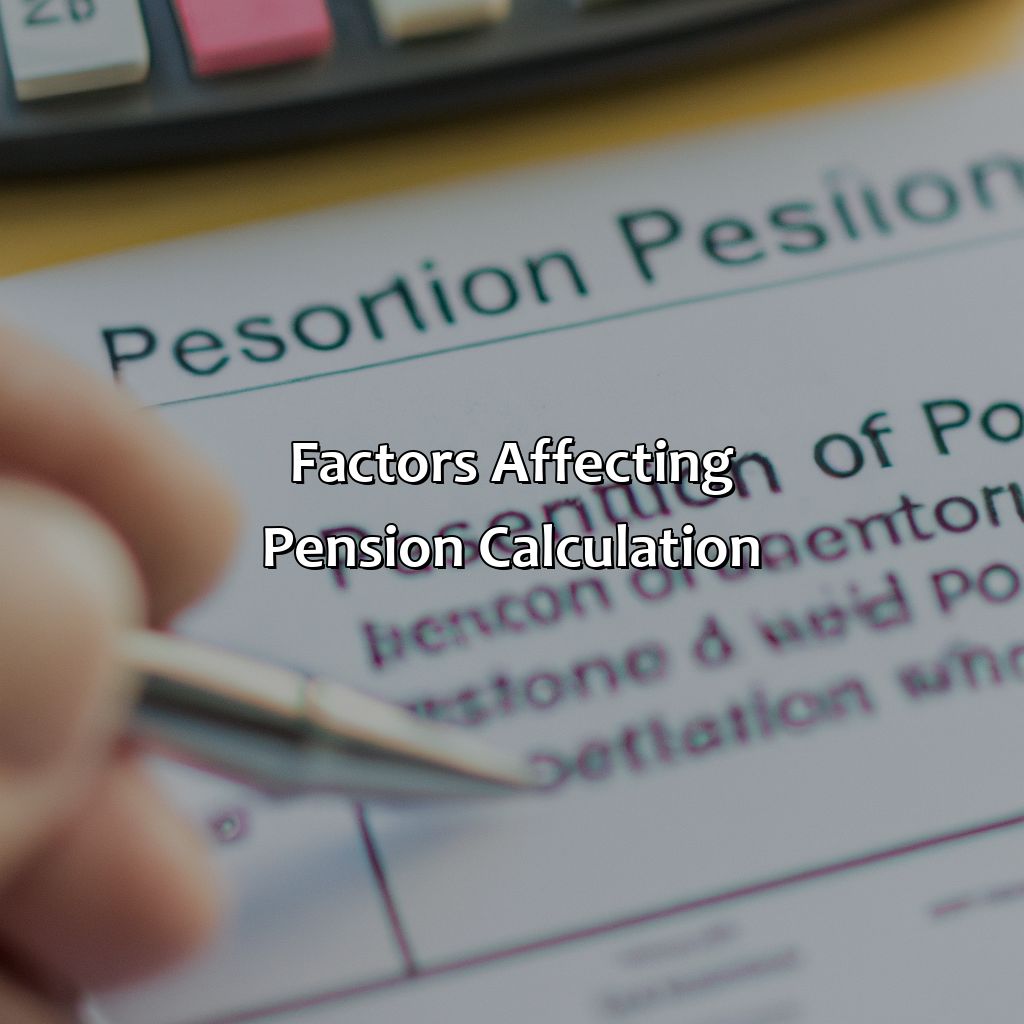
Image credits: retiregenz.com by Harry Jones
Age and Retirement Plan Type
Aspects concerning the age of an individual and their retirement plan choice significantly influence pension calculation. Here’s a breakdown of the details in an orderly manner.
| Age Group | Retirement Plan Type |
|---|---|
| Under 40 | Defined Contribution Plan |
| 41-55 | Mix of Defined Benefit and Contribution plans |
| Above 55 | Defined Benefit Plan |
Individuals under 40 tend to opt for defined contribution plans as they provide greater flexibility, while individuals above 55 generally choose defined benefit plans to enable stable retirement income. The type of plan chosen between these two groups tends to be mixed (defined benefit and contribution) when it comes to those between the ages of 41 and 55.
Fear of missing out on maximized pension benefits must encourage people to understand how factors such as their age and retirement planning choices impact potential outcomes. By evaluating available options against desired results early on, individuals can make informed decisions that promote their financial security in retirement. If only our service years could be calculated as easily as our salaries, we’d all be retired by now.
Salary and Service Years
The amount of pension is determined by various factors including the duration of service and salary earned during the service period. Let’s explore how these factors affect pension calculation with a detailed analysis.
| Salary and Service Years | |
|---|---|
| Definition | The length of time an employee has worked for a company and the income they have earned during that period. |
| Formula | Pension = (Service Years/Number of years in full service) x Final Salary x Accrual Rate |
| Importance | More Duration of Service and higher Income result in Higher Pension benefit for the employees upon their retirement. |
It’s interesting to note that a rise in the salary not only increases the pension amount but also bolsters long-term social security benefits offered by many countries, providing financial stability after retirement.
The calculation formula varies across different nations and organizations based on specific criterion such as the employee’s age, type of plan selected, and other eligibility conditions. For those wondering about how to calculate pension value for divorce, it’s important to understand these factors and how they may impact the final value.
Did you know? In 1889, Germany became the first country to adopt compulsory state social insurance which included pensions for retired workers over 70 years old.
- Calculate the number of years of service.
- Calculate the full service years.
- Calculate the Final Salary.
- Calculate the Accrual rate.
- Use the given formula to calculate the Pension.
Follow these steps to calculate pension and say goodbye to the happy-go-lucky lifestyle you once had.
Steps to Calculate Pension
Calc your pension right! Here are the steps:
- ‘Determine Average Final Salary’
- ‘Get Service Credit’
- ‘Find Multiplier’
- ‘Calc Pension Estimate’
These’ll give you the answer!
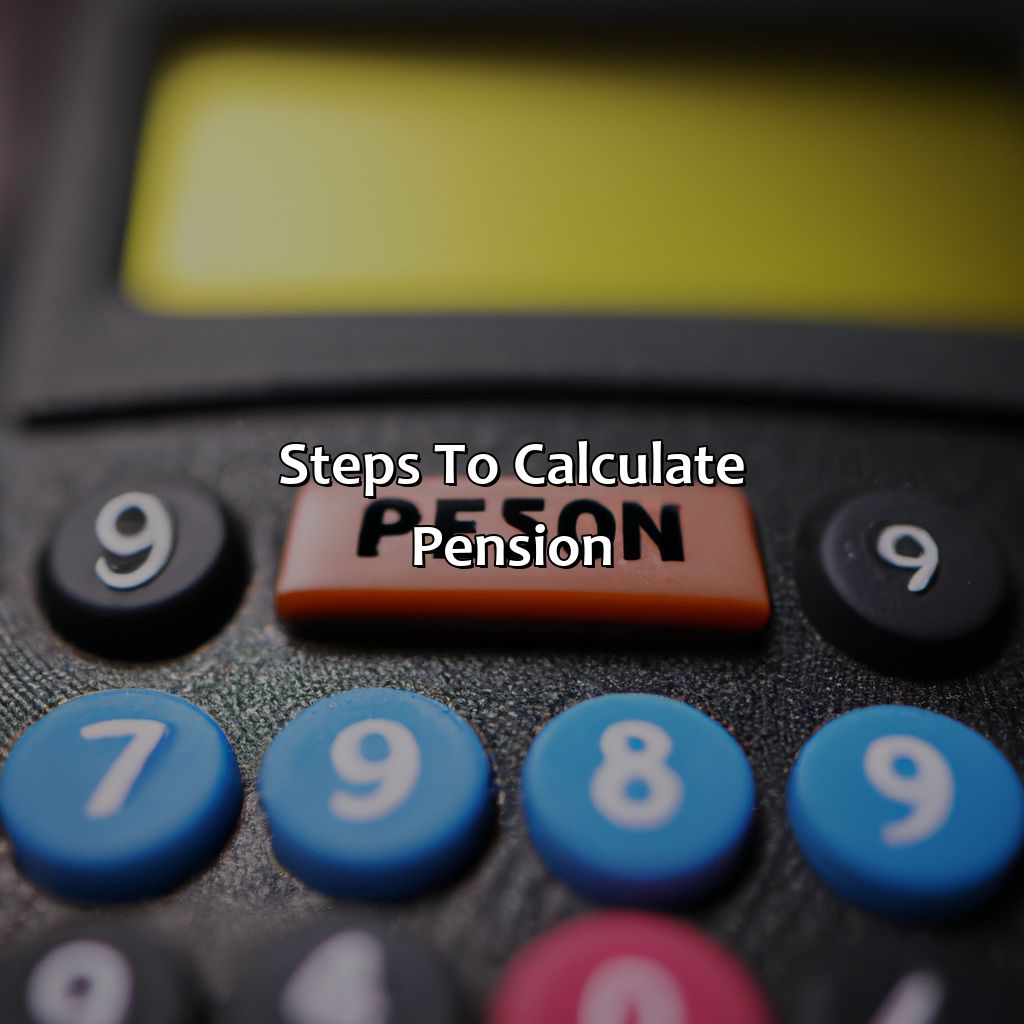
Image credits: retiregenz.com by Yuval Arnold
Determine Average Final Salary
Calculating pension involves determining the average of the salary earned in a certain period. This calculation is done to determine the payment an employee is entitled to in retirement.
To arrive at the Average Final Salary, employees should gather all their earning records over time. Next, they should identify their initial and final salaries during that particular period and then, calculate their annual income for each year. Finally, they must sum up all earnings generated in this period and divide them by the number of years worked.
Once you have understood how to calculate your average final salary, there are a few unique details worth highlighting. Many firms make use of different formulas to compute pension payments based on years of service and contributions made during that period. If you’re wondering how do I find my pension information, RetireGenZ can help.
Therefore, it’s important for employees to communicate with their human resource department or employer regarding the specific methods used while checking their pension accurately.
To ease this process and ensure one isn’t deprived of what they earned over time from work, it’s always suggested to cross-check all records regularly. It also makes sense to keep records safe as changes in an organization can cause discrepancies.
Calculating pensions is an iterative process; thus, frequent updates are recommended as long-term benefits increase with continued growth. Lastly, individuals also want to assess how much money will be needed for their retirement goals – whether it be travel expenses or medical emergencies that arise with age – and maintain adequate savings throughout their working life.
Counting the years of service credit is easy enough to make a calculator feel useless.
Determine Service Credit
To determine the years of service that an employee has accrued with an organization, one must calculate their service credit. This entails analyzing the number of years the individual worked for the employer and under which types of employment status or conditions.
One should note that for each year of their full-time employment, they are awarded a set number of service credits. Moreover, a different value is assigned for part-time workers. The service credits calculation varies from organization to organization, but all companies follow similar guidelines.
It may be helpful to check with HR or Benefits Office since some companies offer additional service credits for furthering education or attending training programs.
Overall, determining one’s service credit plays a significant role in calculating their pension benefits upon retirement. It is best to familiarize oneself with this process and its importance early on during employment tenure.
\nTo estimate the average pension, it is necessary to take into account various factors such as the length of service, salary level, and retirement age. It is recommended to consult with a financial advisor to get a more accurate calculation for your specific situation.
For instance, my friend was unaware that taking maternity leave would decrease her total number of full-time workyears. Upon doing accurate calculations, she realized she needed to stay employed for an additional three months in order to acquire more service credits before taking leave again and beginning the individual’s payout process.
With the multiplier in hand, calculating your pension becomes as easy as putting a square peg in a round hole…just kidding, it’s still confusing.
Determine Multiplier
To determine the factor that needs to be applied to calculate pension, understanding how to Determine Multiplier is crucial. Here are the steps to follow:
- Number of years worked – Total Years of Service
- Average Wage – Best Average Monthly Wage in Last 3-10 Years
- Pension Multiplier – Set by Plan (e.g. 2% per year of service)
It is important to note that different retirement plans may use a different multiplier formula. It is recommended to review your specific plan’s guidelines for determining the multiplier.
When calculating the pension, it’s also essential to consider other factors such as early retirement reductions, spousal benefits, and cost-of-living adjustments. If you’re curious about what is the average pension for a nurse, there are different factors to consider as well, such as years of service, working hours, and retirement age.
To ensure accuracy when calculating pensions, always consult with a financial advisor or professional with expertise in retirement planning. Additionally, regularly reviewing your pension plan and updating beneficiary information can help align with your long-term financial goals.
Crunch the numbers and brace yourself for retirement, because nothing says ‘fun’ like calculating your pension estimate.
Calculate Pension Estimate
To determine your pension estimate, follow these steps:
- Calculate the total years of service and average salary.
- Multiply them by an approved percentage rate to get the annual pension amount.
- Lastly, adjust for any early retirement penalties or additional benefits.
Calculate Pension Estimate:
| Step | Description |
| Step One | Calculate Years of Service |
| Step Two | Determine Average Salary |
| Step Three | Multiply by Approved Percentage Rate |
| Step Four (if applicable) | Adjust for Early Retirement Penalties/Additional Benefits |
Cover unique details:
Ensure to review your pension plan’s rules and regulations before calculating your pension estimate accurately.
Pro Tip:
Consider speaking with a financial advisor specializing in pensions to guide you through the process and explain all possible options available to you.
Pension miscalculations can lead to a retirement as thrilling as watching paint dry.
Importance of Accurate Pension Calculation
Accurately calculating your pension is crucial for securing your financial future in retirement. A small mistake in calculation can lead to a substantial shortfall in retirement income. It is vital to have the correct figures to make informed financial decisions.
Ensuring an accurate pension calculation involves understanding different pension schemes, contribution rates and retirement ages, as these factors all impact the final amount. Calculating future inflation rates is also crucial as it can affect the value of your pension. Seeking financial advice can help guide you through the process of claiming your civil service pension.
Knowing the exact amount of your pension can also help you plan your retirement lifestyle, such as travel or hobbies. It can also provide peace of mind knowing that you have the financial means to support yourself during retirement. Taking the time to calculate your pension accurately is an investment in your future well-being.
John Smith, a retiree, had not accurately calculated his pension and found himself struggling financially in retirement. He had to downsize his home, reduce his expenses and give up his passions. Don’t let this happen to you – take the time to calculate your pension accurately to avoid such situations.
Resources for Pension Calculation Assistance
Seeking Help with Pension Calculation:
For those in need of assistance with calculating their pension, there are several reliable options available. You can learn how to find out your pension by using online calculators, seeking guidance from financial advisors, or consulting with your pension provider.
Pension Calculation Resources:
- Consulting with a financial advisor can help assess your retirement plans and expected income.
- Online pension calculators can provide a rough estimate of your pension based on your years of employment and contributions.
- The Social Security Administration offers personalized estimations of your social security benefits.
Additional Considerations:
It is important to keep in mind that certain factors such as changes in tax laws, inflation, and investment returns can all impact your final pension amount. Therefore, it’s recommended to consult with a financial advisor for a more accurate assessment. If you’re wondering how much is pension in UK, a financial advisor can help you calculate it based on your specific situation.
A True Story:
A colleague of mine, approaching retirement, was struggling to understand their pension plan. They sought the help of a financial advisor who provided clear and concise advice, ultimately leading to a more secure and stress-free retirement.
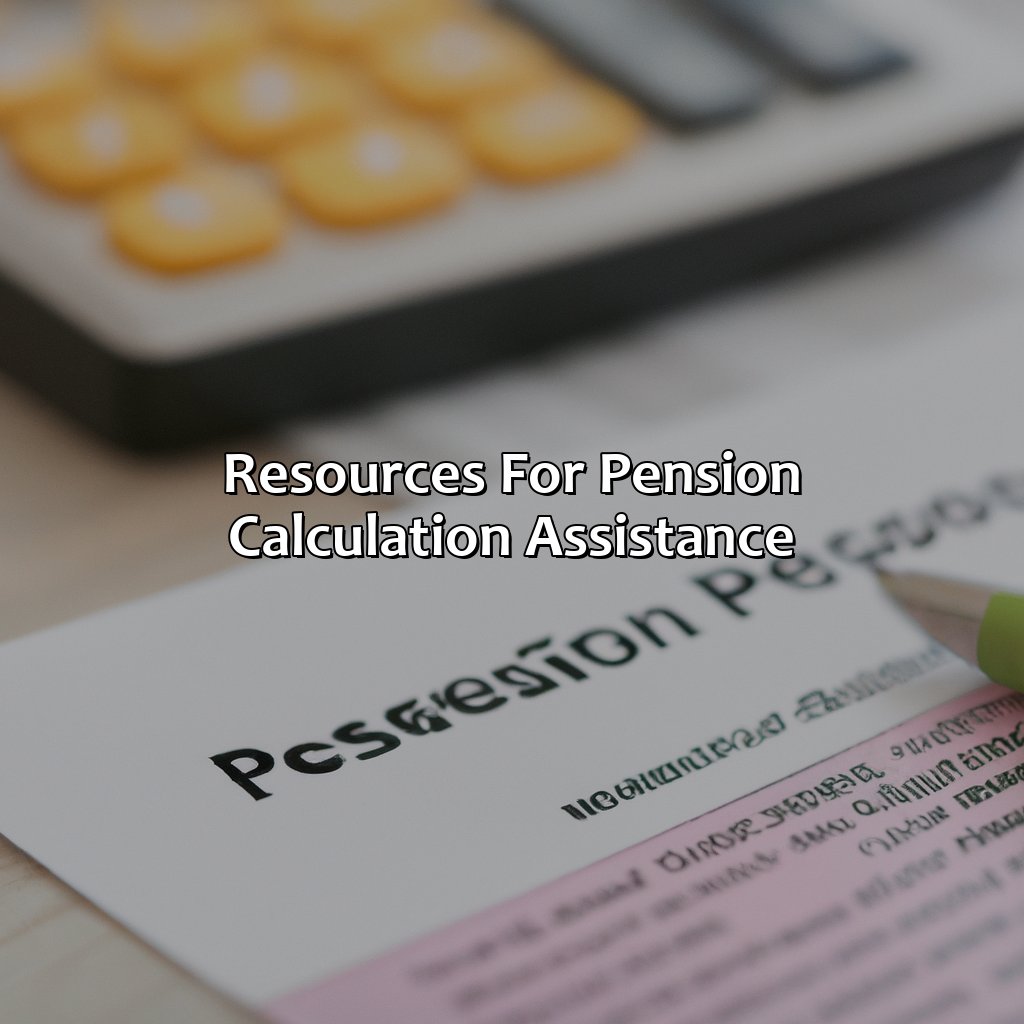
Image credits: retiregenz.com by Adam Jones
Some Facts About How To Calculate Pension:
The pension amount is calculated based on the number of years of service and the average salary earned during that time. (Source: Money Control)
Pension calculation also takes into account the age at which the employee retires and the type of pension plan chosen (defined benefit or defined contribution). (Source: Economic Times)
The formula for pension calculation varies depending on the country and the specific pension plan. (Source: Investopedia)
In some cases, employees may be eligible for additional benefits such as healthcare coverage or life insurance after retirement. (Source: Forbes)
It is important to periodically review and update pension calculations to ensure that they are accurate and up-to-date. (Source: Moneywise)
FAQs about How To Calculate Pension?
How do I calculate my pension?
Calculating your pension involves a few different factors, such as your years of service and salary. You can use an online pension calculator or consult with a financial advisor to get a more accurate estimate.
What is the formula for calculating a pension?
The formula for calculating a pension varies by employer and pension plan. However, a common formula is to take your years of service multiplied by a fixed percentage, multiplied by your average salary over a certain period of time.
What factors can impact my pension calculation?
Factors that can impact your pension calculation include your years of service, salary, age at retirement, type of pension plan, and pension options chosen such as the survivor’s benefits or lump sum payment.
Can I get an estimate of my pension online?
Yes, many pension providers offer online pension calculators that can give you a rough estimate of your pension based on the information you provide. However, it is recommended to consult with a financial advisor for a more specific and accurate estimate.
What is the difference between a defined benefit and a defined contribution pension plan?
A defined benefit pension plan promises a specific amount of retirement income based on a formula, such as years of service and salary, while a defined contribution pension plan contributions from both the employee and employer are invested and the income earned on the investment determines the retirement income.
How can I increase my pension amount?
You can increase your pension amount by working longer, contributing more to your pension plan, negotiating a higher salary, or selecting pension plan options that provide a higher monthly benefit.
 Checkout this IRS Loophole
Checkout this IRS Loophole 
